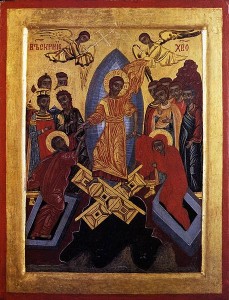
All my adult life I have been a Presbyterian. As often as possible during that same adult life I have worshipped among the Orthodox.
It has not been that often in the sheer number of occasions–some glorious opportunities to hear the Liturgy St. Vladimir’s Seminary when I was in seminary and graduate school; a smaller number of visits to the tiny building and burgeoning congregation of Holy Trinity Church up in the Cascade foothills in Wilkinson Washington; one memorable trip to St. Mark’s Syrian Orthodox Cathedral in New Jersey; and an increasingly regular participation in Vespers on Saturday evenings at St. Elias the Prophet Greek Orthodox Church in Dubuque, Iowa where I live.
When I compare Orthodox Vespers to Western versions of Vespers and other hours, especially to the pre-Vatican II Roman Catholic versions, there is a striking difference in the place of hymns. The Western office is primarily shaped by the singing of Psalms. The Orthodox version by the singing of hymns.
Psalms are still there in the East, but often a Psalm just provides a frame upon which hymns are sung. That is, a verse of the Psalm is chanted, then a much longer hymn; another Psalm verse leads into another longer hymn; all the way to the end.
The cycle of hymns in Orthodox worship is elaborate, with multiple dimensions: each day of the week has its theological topic (Saturday Vespers is the start of Sunday, so the topic is Christ’s Resurrection), but each week has its musical “tone,” and these recur in an eight week cycle.
That comes to 56 separate batches of hymns for each of the daily “hours” of the Divine Office. Or just eight, if the church only offers Saturday Vespers publicly. Still, in each of those eight there are about ten hymns counting only those woven between Psalm verses.
We Protestants have lots of hymns too, of course, though we hold them more loosely, with big hymnals and informal collections drawn in at the will of the worship planner. The Orthodox system has far less flex, the leaders and congregation giving way to the collective practice, wisdom, or will of many centuries.
Less individual choice in Orthodoxy. But probably more actual variety, numerically–many a Protestant congregation chooses rather narrowly based on tastes and preferences.
Less theological range in Orthodoxy–every single Saturday Vespers of the eight week cycle of tones is on the Resurrection.
Less range, but more theological depth: Protestants chant that God is an awesome God. Orthodox chant about the consubstantial, undivided Trinity dwelling in unapproachable light.
Here are a couple of the hymns from one Saturday Vespers (don’t expect rhyme and meter!)
We offer up to You our evening worship,
O You who are the unsetting Light,
For You have arisen on the world
at the completeness of time as in a mirror,
descending into Hades,
thereby setting free those in darkness,
and revealing to the nations the light of the Resurrection.
O Lord, Giver of Light, glory to you.
O Giver of Life,
Your pierced side poured streams of remission,
life and salvation to us all.
By taking upon Yourself death in the flesh,
You have granted us immortality
and taking up Your abode in the tomb,
You have set us all free,
and as God You have raised us up with You in glory.
Therefore we cry aloud:
Glory unto You, O Lord who loves mankind.
These are just two, basically at random. They don’t tell you the full story. But if you listen to all the hymns of one service (or better still, to the whole cycle of eight weeks) you absolutely get a full picture. It is a picture of the power of the resurrection.
Among Protestants the cross is so dominant that it is actually hard to see the role of the resurrection in salvation. The cross is fully present in Orthodoxy, given its full due. But their hymns explore the wonder of Christ’s glorious resurrection so fully that you cannot help but see the centrality of Easter to salvation.
That is the thing. They do not just say “Praise the Lord!” Orthodox hymns proclaim the great saving actions of God. They articulate what is good and awesome in what God has done.
Listen to the hymns in your church this Sunday, whatever your denomination. How much of it is vague? How much of it is about you–the feelings or actions of the person singing? How much is about us–the human community, penitent or self-congratulatory?
I guarantee you the Orthodox are singing the praises of God
————
If you read this far, why not scroll down and subscribe for email updates? I’d love to explore the best of the Christian past with you!

I’m always very interested to hear others describe aspects of Orthodoxy, and I think you summed up vespers beautifully, and that’s no always easy to do with Orthodoxy 😉
I pray you had a blessed Thanksgiving!
Thanks so much Fr. Dustin. We had a lovely quiet day, and a noteable feast at the end. I hope your Thanksgiving was also a blessing.
Gary